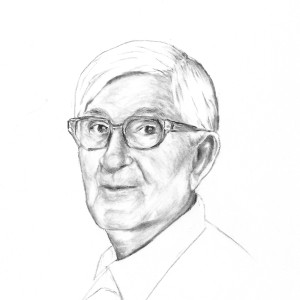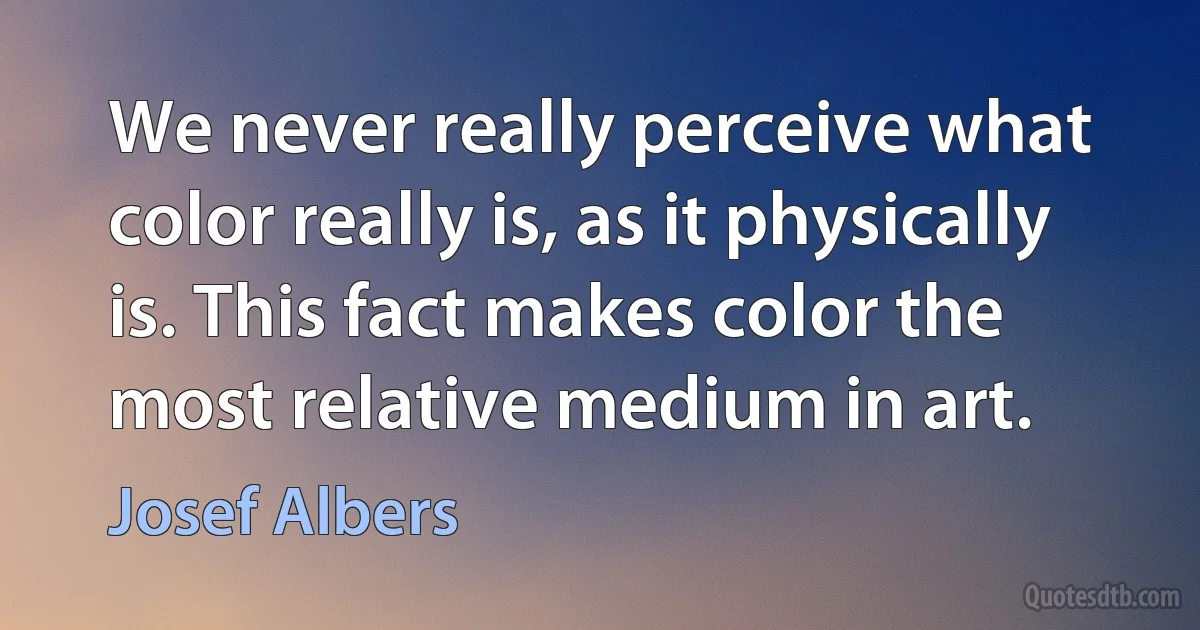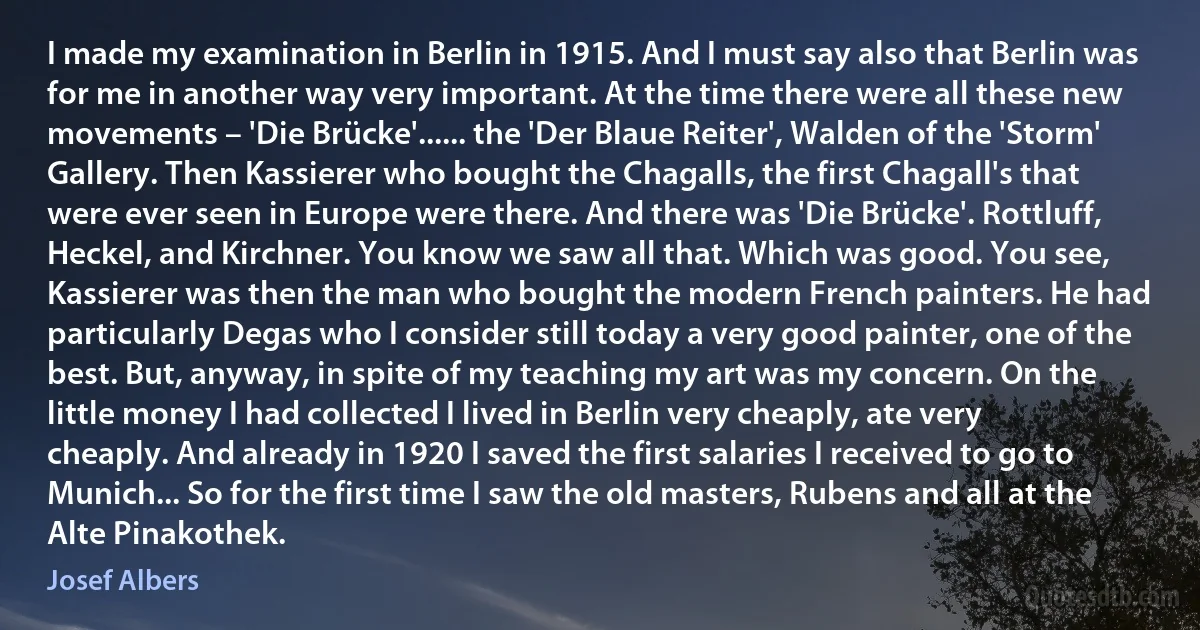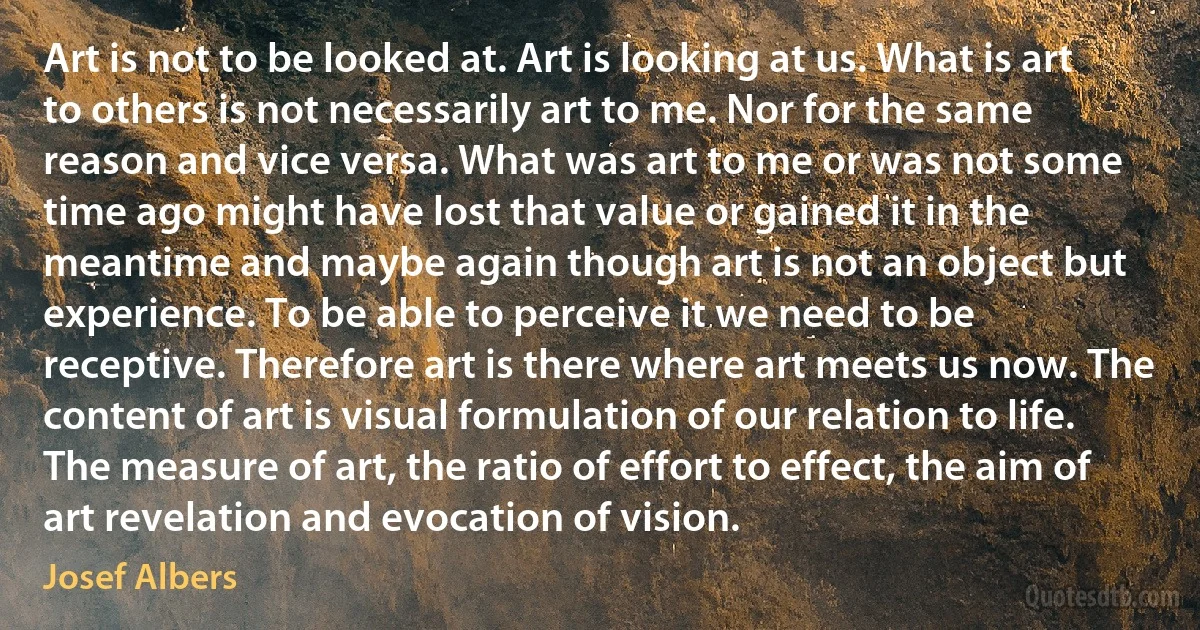Josef Albers quotes
Josef Albers was a German-born artist and influential educator, celebrated for his pioneering work in abstract art and color theory. His "Homage to the Square" series explored how colors interact and affect perception. He became a key figure in the Bauhaus movement and inspired generations of artists and designers. Here are 56 of his quotes:
I think it's true, as many say, I have dealt for many years with the problems that w:Op art so-called, is dealing with. For many years I have studied the logic and magic of color. And so I know what's involved when it comes to the interaction of colors, more than many who refuse to study it. But I found a way to study it, I think, that's all. And besides I refuse to be the father of a new bandwagon.

Josef Albers
Duplicity in events: What happens here as new, happens somewhere else just the same way. That's so exciting. That is one of the secrets of life. Why did I sometimes build a lamp in the Bauhaus and somebody comes from Holland and says, 'Oh, somebody in Holland makes just the same lamp.' Such duplicity shows that the time is ripe for a problem and thus it is in the air, and will be solved here – and there. With this we are finding the 'creative process', for which somebody is coming to ask me about. I would say, 'I paint because I have no time not to paint.

Josef Albers
I discovered soon that teaching has the handicap of retrospection. And that I don't believe in. So I started [at the w:Bauhaus in Dessau] instead a method of handling material with the material itself. So that was my main change. Whereas Itten before [Itten left the Bauhaus in 1923 and Albers followed him as art-teacher] had only spoken about the appearance, 'matiere' - (the French word) and I said I would turn from 'matiere' - the outside - to the inside, to the capacity of the material, before the appearance. And that changed the attitude basically I think.

Josef Albers
In 1923, when I had been a student at the 'Bauhaus' in Weimar.. ..Gropius [the director of Bauhaus] asked me to teach the basic course 'Werklehhre'. He wanted me to introduce newcomers to the principles of handicrafts. He knew that I came from that background and had appropriate practice and knowledge.

Josef Albers
I have not built any theory. I have only tried to build up sensitive eyes, as my book says. And I have tried to achieve that by aiming at very distinct color relationships again – like how do they influence each other? Change each other in light and in intensity, in transparency, opacity? How do they change each other in all different directions? That we make all the students aware, through experience, that color is the most relative medium in art, and that we never really see what we see. All neighboring means which occur every minute different, not only in changing light but also by our changing moods. And in the end, the study of color again is a study of ourselves.

Josef Albers
That question is so big that there is no end [Albers refers here to the relationship between colors and the source of light]. You see, they have just you cannot participate with it if you have not lubricated your eyes very thoroughly to see the little changes produced in our eye that has another action than any optical apparatus like photography. We must know that we have two ways of seeing. For instance, when we are indoors another part of the retina is engaged compared with when we are outdoors. If we are in warm light or cool light, in higher light or lower light.

Josef Albers
There science is dealing with physical facts, in art we are dealing with psychic effects. With this I come to my first statement: 'The source of art – that is, where it comes from – is the discrepancy between physical fact and psychic effect'. That's what I'm talking about. When I want to speak about why I am doing the same thing now, which is squares, for – how long? – 19 years. Because there is no final solution in any visual formulation. Although this may be just a belief on my part, I have some assurances that that is not the most stupid thing to do, through Cezanne whom I consider as one of the greatest painters. From Cézanne we have, so the historians tell us – 250 paintings of Mont St. Victoire. But we know that Cézanne has left in the fields often more than he took home because he was disappointed with his work. So we may conclude he did many more than 250 of the same problem.

Josef Albers
I have received a question I have expected, 'Don't you deal with accidents?' Yes, I deal with accidents, just as Arp admits it all the time. And I admit it, too. But I like to have them under my command and not sign them because they are accidents. If it remains only accident then sign it 'accident' or 'fate' or 'the Lord', whatever you prefer. It's not you because you have not visioned it. You see visual formulation deals with vision, visual information and visual reaction. So I speak differently from all those who deliver themselves to uncontrolled accidents.

Josef Albers
Josef Albers

Photo:
Ida Berger,
CC BY-SA 4.0
Occupation: German-American Designer
Born: March 19, 1888
Died: March 25, 1976
Quotes count: 56
Wikipedia: Josef Albers












